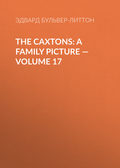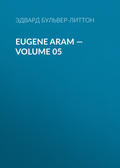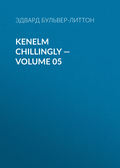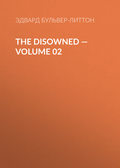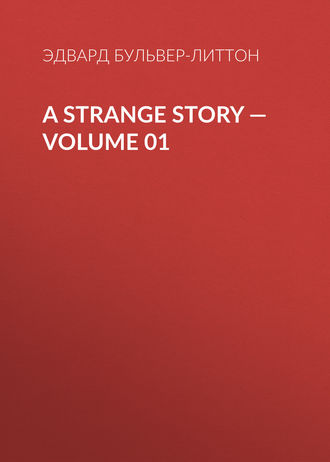
Эдвард Бульвер-Литтон
A Strange Story — Volume 01
CHAPTER III
It was some time before I could shake off the impression made on me by the words and the look of that dying man.
It was not that my conscience upbraided me. What had I done? Denounced that which I held, in common with most men of sense in or out of my profession, to be one of those illusions by which quackery draws profit from the wonder of ignorance. Was I to blame if I refused to treat with the grave respect due to asserted discovery in legitimate science pretensions to powers akin to the fables of wizards? Was I to descend from the Academe of decorous science to examine whether a slumbering sibyl could read from a book placed at her back, or tell me at L—— what at that moment was being done by my friend at the Antipodes?
And what though Dr. Lloyd himself might be a worthy and honest man, and a sincere believer in the extravagances for which he demanded an equal credulity in others, do not honest men every day incur the penalty of ridicule if, from a defect of good sense, they make themselves ridiculous? Could I have foreseen that a satire so justly provoked would inflict so deadly a wound? Was I inhumanly barbarous because the antagonist destroyed was morbidly sensitive? My conscience, therefore, made me no reproach, and the public was as little severe as my conscience. The public had been with me in our contest; the public knew nothing of my opponent's deathbed accusations; the public knew only that I had attended him in his last moments; it saw me walk beside the bier that bore him to his grave; it admired the respect to his memory which I evinced in the simple tomb that I placed over his remains, inscribed with an epitaph that did justice to his unquestionable benevolence and integrity; above all, it praised the energy with which I set on foot a subscription for his orphan children, and the generosity with which I headed that subscription by a sum that was large in proportion to my means.
To that sum I did not, indeed, limit my contribution. The sobs of the poor female child rang still on my heart. As her grief had been keener than that of her brothers, so she might be subjected to sharper trials than they, when the time came for her to fight her own way through the world; therefore I secured to her, but with such precautions that the gift could not be traced to my hand, a sum to accumulate till she was of marriageable age, and which then might suffice for a small wedding portion; or if she remained single, for an income that would place her beyond the temptation of want, or the bitterness of a servile dependence.
That Dr. Lloyd should have died in poverty was a matter of surprise at first, for his profits during the last few years had been considerable, and his mode of life far from extravagant. But just before the date of our controversy he had been induced to assist the brother of his lost wife, who was a junior partner in a London bank, with the loan of his accumulated savings. This man proved dishonest; he embezzled that and other sums intrusted to him, and fled the country. The same sentiment of conjugal affection which had cost Dr. Lloyd his fortune kept him silent as to the cause of the loss. It was reserved for his executors to discover the treachery of the brother-in-law whom he, poor man, would have generously screened from additional disgrace.
The Mayor of L——, a wealthy and public-spirited merchant, purchased the museum, which Dr. Lloyd's passion for natural history had induced him to form; and the sum thus obtained, together with that raised by subscription, sufficed not only to discharge all debts due by the deceased, but to insure to the orphans the benefits of an education that might fit at least the boys to enter fairly armed into that game, more of skill than of chance, in which Fortune is really so little blinded that we see, in each turn of her wheel, wealth and its honours pass away from the lax fingers of ignorance and sloth, to the resolute grasp of labour and knowledge.
Meanwhile a relation in a distant county undertook the charge of the orphans; they disappeared from the scene, and the tides of life in a commercial community soon flowed over the place which the dead man had occupied in the thoughts of his bustling townsfolk.
One person at L——, and only one, appeared to share and inherit the rancour with which the poor physician had denounced me on his death-bed. It was a gentleman named Vigors, distantly related to the deceased, and who had been, in point of station, the most eminent of Dr. Lloyd's partisans in the controversy with myself, a man of no great scholastic acquirements, but of respectable abilities. He had that kind of power which the world concedes to respectable abilities when accompanied with a temper more than usually stern, and a moral character more than usually austere. His ruling passion was to sit in judgment upon others; and being a magistrate, he was the most active and the most rigid of all the magistrates L—— had ever known.
Mr. Vigors at first spoke of me with great bitterness, as having ruined, and in fact killed, his friend, by the uncharitable and unfair acerbity which he declared I had brought into what ought to have been an unprejudiced examination of simple matter of fact. But finding no sympathy in these charges, he had the discretion to cease from making them, contenting himself with a solemn shake of his head if he heard my name mentioned in terms of praise, and an oracular sentence or two, such as "Time will show," "All's well that ends well," etc. Mr. Vigors, however, mixed very little in the more convivial intercourse of the townspeople. He called himself domestic; but, in truth, he was ungenial,—a stiff man, starched with self-esteem. He thought that his dignity of station was not sufficiently acknowledged by the merchants of Low Town, and his superiority of intellect not sufficiently recognized by the exclusives of the Hill. His visits were, therefore, chiefly confined to the houses of neighbouring squires, to whom his reputation as a magistrate, conjoined with his solemn exterior, made him one of those oracles by which men consent to be awed on condition that the awe is not often inflicted. And though he opened his house three times a week, it was only to a select few, whom he first fed and then biologized. Electro-biology was very naturally the special entertainment of a man whom no intercourse ever pleased in which his will was not imposed upon others. Therefore he only invited to his table persons whom he could stare into the abnegation of their senses, willing to say that beef was lamb, or brandy was coffee, according as he willed them to say. And, no doubt, the persons asked would have said anything he willed, so long as they had, in substance, as well as in idea, the beef and the brandy, the lamb and the coffee. I did not, then, often meet Mr. Vigors at the houses in which I occasionally spent my evenings. I heard of his enmity as a man safe in his home hears the sough of a wind on a common without. If now and then we chanced to pass in the streets, he looked up at me (he was a small man walking on tiptoe) with a sullen scowl of dislike; and from the height of my stature, I dropped upon the small man and sullen scowl the affable smile of supreme indifference.
CHAPTER IV
I had now arrived at that age when an ambitious man, satisfied with his progress in the world without, begins to feel in the cravings of unsatisfied affection the void of a solitary hearth. I resolved to marry, and looked out for a wife. I had never hitherto admitted into my life the passion of love. In fact, I had regarded that passion, even in my earlier youth, with a certain superb contempt,—as a malady engendered by an effeminate idleness, and fostered by a sickly imagination.
I wished to find in a wife a rational companion, an affectionate and trustworthy friend. No views of matrimony could be less romantic, more soberly sensible, than those which I conceived. Nor were my requirements mercenary or presumptuous. I cared not for fortune; I asked nothing from connections. My ambition was exclusively professional; it could be served by no titled kindred, accelerated by no wealthy dower. I was no slave to beauty. I did not seek in a wife the accomplishments of a finishing-school teacher.
Having decided that the time had come to select my helpmate, I imagined that I should find no difficulty in a choice that my reason would approve. But day upon day, week upon week, passed away, and though among the families I visited there were many young ladies who possessed more than the qualifications with which I conceived that I should be amply contented, and by whom I might flatter myself that my proposals would not be disdained, I saw not one to whose lifelong companionship I should not infinitely have preferred the solitude I found so irksome.
One evening, in returning home from visiting a poor female patient whom I attended gratuitously, and whose case demanded more thought than that of any other in my list,—for though it had been considered hopeless in the hospital, and she had come home to die, I felt certain that I could save her, and she seemed recovering under my care,—one evening—it was the fifteenth of May—I found myself just before the gates of the house that had been inhabited by Dr. Lloyd. Since his death the house had been unoccupied; the rent asked for it by the proprietor was considered high; and from the sacred Hill on which it was situated, shyness or pride banished the wealthier traders. The garden gates stood wide open, as they had stood on the winter night on which I had passed through them to the chamber of death. The remembrance of that deathbed came vividly before me, and the dying man's fantastic threat rang again in my startled ears. An irresistible impulse, which I could not then account for, and which I cannot account for now,—an impulse the reverse of that which usually makes us turn away with quickened step from a spot that recalls associations of pain,—urged me on through the open gates up the neglected grass-grown road, urged me to look, under the weltering sun of the joyous spring, at that house which I bad never seen but in the gloom of a winter night, under the melancholy moon. As the building came in sight, with dark-red bricks, partially overgrown with ivy, I perceived that it was no longer unoccupied. I saw forms passing athwart the open windows; a van laden with articles of furniture stood before the door; a servant in livery was beside it giving directions to the men who were unloading. Evidently some family was just entering into possession. I felt somewhat ashamed of my trespass, and turned round quickly to retrace my steps. I had retreated but a few yards, when I saw before me, at the entrance gates, Mr. Vigors, walking beside a lady apparently of middle age; while, just at hand, a path cut through the shrubs gave view of a small wicketgate at the end of the grounds. I felt unwilling not only to meet the lady, whom I guessed to be the new occupier, and to whom I should have to make a somewhat awkward apology for intrusion, but still more to encounter the scornful look of Mr. Vigors in what appeared to my pride a false or undignified position. Involuntarily, therefore, I turned down the path which would favour my escape unobserved. When about half way between the house and the wicket-gate, the shrubs that had clothed the path on either side suddenly opened to the left, bringing into view a circle of sward, surrounded by irregular fragments of old brickwork partially covered with ferns, creepers, or rockplants, weeds, or wild flowers; and, in the centre of the circle, a fountain, or rather well, over which was built a Gothic monastic dome, or canopy, resting on small Norman columns, time-worn, dilapidated. A large willow overhung this unmistakable relic of the ancient abbey. There was an air of antiquity, romance, legend about this spot, so abruptly disclosed amidst the delicate green of the young shrubberies. But it was not the ruined wall nor the Gothic well that chained my footstep and charmed my eye.
It was a solitary human form, seated amidst the mournful ruins.
The form was so slight, the face so young, that at the first glance I murmured to myself, "What a lovely child!" But as my eye lingered it recognized in the upturned thoughtful brow, in the sweet, serious aspect, in the rounded outlines of that slender shape, the inexpressible dignity of virgin woman.
A book was on her lap, at her feet a little basket, half-filled with violets and blossoms culled from the rock-plants that nestled amidst the ruins. Behind her, the willow, like an emerald waterfall, showered down its arching abundant green, bough after bough, from the tree-top to the sward, descending in wavy verdure, bright towards the summit, in the smile of the setting sun, and darkening into shadow as it neared the earth.
She did not notice, she did not see me; her eyes were fixed upon the horizon, where it sloped farthest into space, above the treetops and the ruins,—fixed so intently that mechanically I turned my own gaze to follow the flight of hers. It was as if she watched for some expected, familiar sign to grow out from the depths of heaven; perhaps to greet, before other eyes beheld it, the ray of the earliest star.
The birds dropped from the boughs on the turf around her so fearlessly that one alighted amidst the flowers in the little basket at her feet. There is a famous German poem, which I had read in my youth, called the Maiden from Abroad, variously supposed to be an allegory of Spring, or of Poetry, according to the choice of commentators: it seemed to me as if the poem had been made for her. Verily, indeed, in her, poet or painter might have seen an image equally true to either of those adornments of the earth; both outwardly a delight to sense, yet both wakening up thoughts within us, not sad, but akin to sadness.
I heard now a step behind me, and a voice which I recognized to be that of Mr. Vigors. I broke from the charm by which I had been so lingeringly spell-bound, hurried on confusedly, gained the wicket-gate, from which a short flight of stairs descended into the common thoroughfare. And there the every-day life lay again before me. On the opposite side, houses, shops, church-spires; a few steps more, and the bustling streets! How immeasurably far from, yet how familiarly near to, the world in which we move and have being is that fairy-land of romance which opens out from the hard earth before us, when Love steals at first to our side, fading back into the hard earth again as Love smiles or sighs its farewell!



